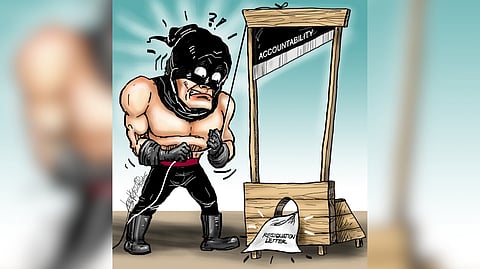
- NEWS
- the EDIT
- COMMENTARY
- BUSINESS
- LIFE
- SHOW
- ACTION
- GLOBAL GOALS
- SNAPS
- DYARYO TIRADA
- MORE

Vince Dizon is not the sort of man you’d call timid. Thrust suddenly into the Department of Public Works and Highways (DPWH), after putting things in order at the Department of Transportation, he has come out swinging with a sledgehammer.
On his first day, he demanded the courtesy resignation of every ranking official of the agency, from undersecretaries to district engineers. It was, he assured, the President’s first and only directive: clean up the DPWH.
It is a bold move, yes, but one that is a familiar echo. Remember when President Marcos demanded courtesy resignations of government officials?
That was supposed to shake the tree, rattle the branches, and let the rotten fruit fall. In practice, very few heads rolled. The bureaucracy, like bamboo, bends but rarely breaks. Which is why Dizon’s order may not resonate with the thunderclap he intended.
Still, Dizon deserves some credit. At least he is not pretending the problem is just a few “bad apples.” Ghost projects — that devour public funds with nary a trace of concrete or steel — do not simply materialize.
People in the DPWH, including the scoundrels, have to sign the papers, process the vouchers, and nod approvingly at the receipts for the projects. Those signatories are not phantoms. Dizon’s insistence that insiders must be held to account is both obvious and necessary.
But he should take stock of history. The DPWH has survived reformists, technocrats, and even generals. Each came in with a promise to scrub the agency clean; each left with the dirt still under the fingernails.
It is not that they were lacking in resolve — it’s because agencies like the DPWH, the Bureau of Internal Revenue, and the Bureau of Customs have always adapted, and learned to outlast their would-be reformers.
So what does Dizon have that the others did not? For one, he has the full backing of a President stung by public embarrassment. Marcos himself displayed the receipts of ghost projects, a theatrical flourish meant to convey disgust.
But presidential temper, like courtesy resignations, is a fleeting thing. If Marcos could demand the resignations of his Cabinet members only to quietly move on, why should the thieving officials and engineers of DPWH fear that this time will be different?
That is the question Dizon must answer not with words but with results. If the resignations lead to actual dismissals, prosecutions, and reforms in contracting, then he will have earned his hammer.
Yet even as Dizon prepares his purge, the political theater elsewhere shows the contradictions.
The Senate Blue Ribbon Committee, in its second hearing on the flood control fiasco on Monday, granted resigned DPWH chief Manuel Bonoan’s request to be excused. His reason? Since his resignation had been accepted by the President, he no longer had the “official capacity” to speak for the department. The senators agreed.
One wonders if accountability can really be so easily discharged. To resign is not to be absolved. Flood control projects were signed, paid for, and in some cases never built under Bonoan’s watch.
Command responsibility, the President tells us, is why Bonoan stepped down. Yet command responsibility does not vanish with a resignation letter. It is precisely why the Senate should have kept him at the table — to explain what went wrong, and who profited from it.
Instead, Bonoan exited the hearing with a polite bow, leaving the mess to his successor. That, too, is the danger for Dizon. Courtesy resignations, Senate courtesies, command responsibility — it all risks becoming a polite carousel where accountability is performed, never imposed.
Filipinos have been fooled too many times to settle for theater. The corrupt lawmakers who funneled pork into ghost and substandard projects must hang — together with their cohorts in the DPWH and the private contractors who enriched themselves with billions in taxpayer money.
